Anecdotes from Rejuvrth’s Weekly Food Waste Recycling Sessions
Anecdotes from Rejuvrth’s Weekly Food Waste Recycling Sessions
by-Helene Ng
In the heart of Costa Rhu, a picturesque waterfront condominium overlooking Singapore’s Kallang River, residents are quietly revolutionising waste management through composting. Spearheaded by locally grown Rejuvrth, the initiative invites residents to contribute to a sustainable lifestyle by transforming food waste into nutrient-rich soil.
I joined Rejuvrth as an intern content volunteer, initially drawn by its mission to normalise food composting in Singapore. As every journalist would know–there is no better way to understand an organisation than being in the thick of its action. I thus headed down to Costa Rhu to meet the people behind this movement and see their efforts in action first-hand.
Upon my hurried arrival (I, unfortunately, ran about 25 minutes late due to the confusing Bus 11 that stops at Stadium station twice), I found myself in an unassuming corridor lined with bins. Residents and domestic workers regularly passed by, depositing their food scraps. There was an acidic, earthy smell in the air from the compost bins.
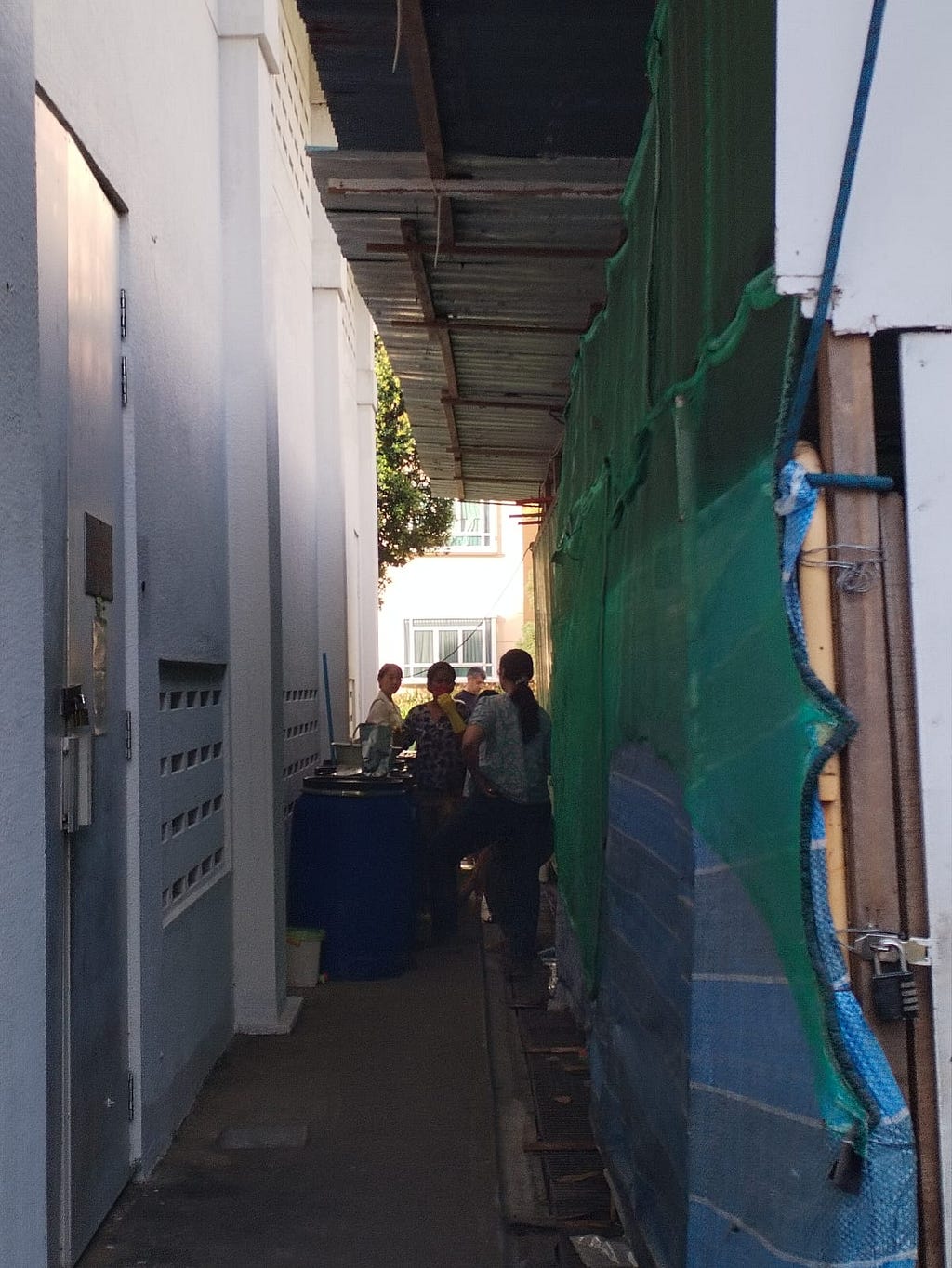
Figure 1: The unassuming corner beside a tennis court where residents congregate to deposit their compost every Saturday morning
Pooja, Rejuvrth’s Project Coordinator at Costa Rhu, oversees the composting process, from waste collection to managing the pre-compost at the community level. Her role, as described by Tripti, the project’s local leader, is essential in ensuring the project flows smoothly, with procedures meticulously followed to keep the process efficient and odour-free. Nearby, Tania, who offers her voluntary support as Rejuvrth’s research lead, discusses sustainable practices with new participants, sharing her experiences and spreading enthusiasm for the project.
This sustainable movement at Costa Rhu has drawn individuals from a multitude of backgrounds. One participant, an expat from Bangalore, noted that in her hometown, composting has become the norm, with organised initiatives for waste segregation at the residential level. This is unlike Singapore’s culture where composting still is not as widespread. Now a part of Costa Rhu’s composting project, she resumes her hometown’s tradition of responsible waste disposal. This initiative has found fertile ground(no pun intended) here, fostering a community invested in environmental preservation.
A Systematic Process for Effective Composting
Costa Rhu’s composting efforts incorporate a well-defined process to optimise waste transformation. It is part of Tanjong Rhu neighbourhood community composting project spread across two condominiums in the neighbourhood Costa Rhu, and Waterside. Each participant receives a Bokashi Bucket, an airtight container with a bottom plate and a tap, along with a packet of Bokashi Bran, which consists of Essential Microbes (EM), sugar/molasses, and a carbon base such as wheat bran, rice bran, or sawdust. Daily, families’ food waste is segregated from general waste and added to the Bokashi bucket in approximately one-inch layers, with a corresponding layer of Bokashi bran spread on top. This process is repeated until the bucket is full, promoting fermentation. The sealed bucket is kept isolated from air and water, with layers of soil and pre-compost added to encourage fermentation. After 25 days, the food waste transforms into rich compost, although items like avocado and mango seeds are excluded as they take over a month to decompose for complete fermentation. Since this project’s compost collection takes place weekly fermented in the blue bins, they have to be discarded. Every Saturday morning, participants empty their buckets into common bins located within the condo premises, where volunteers perform a quality check to ensure no non-compostable items, such as fruit stickers, rubber bands, and cling wrap, are included. Once verified, the food waste is pressed tightly in the bins to eliminate air pockets, as the fermentation process is anaerobic. The bins are then closed for two weeks, resulting in a mass known as pre-compost. Meanwhile, the participants then wash their empty Bokashi buckets at home to prepare for the next cycle.
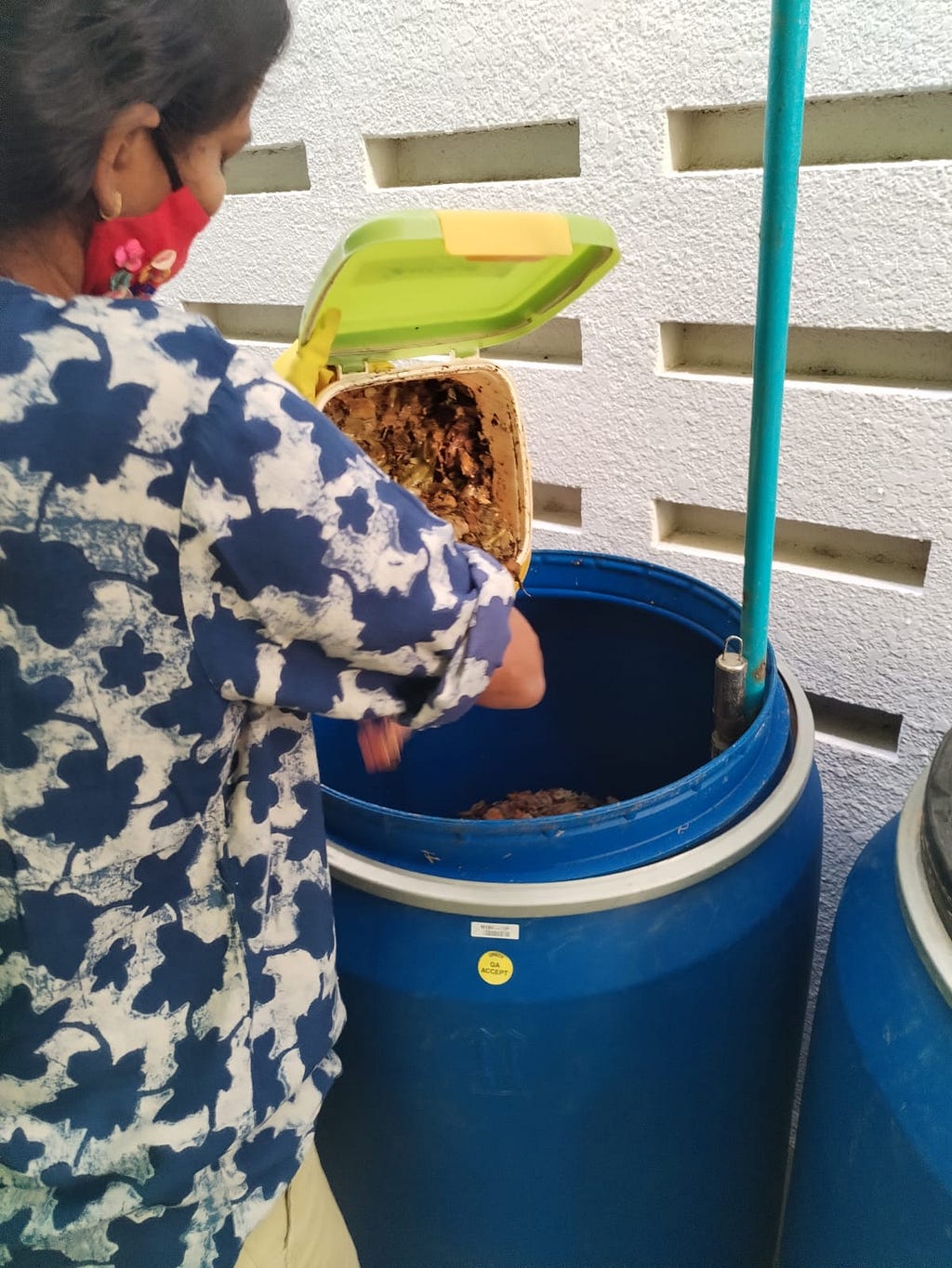
Pooja pours compost from the participants’ buckets into the compost bin
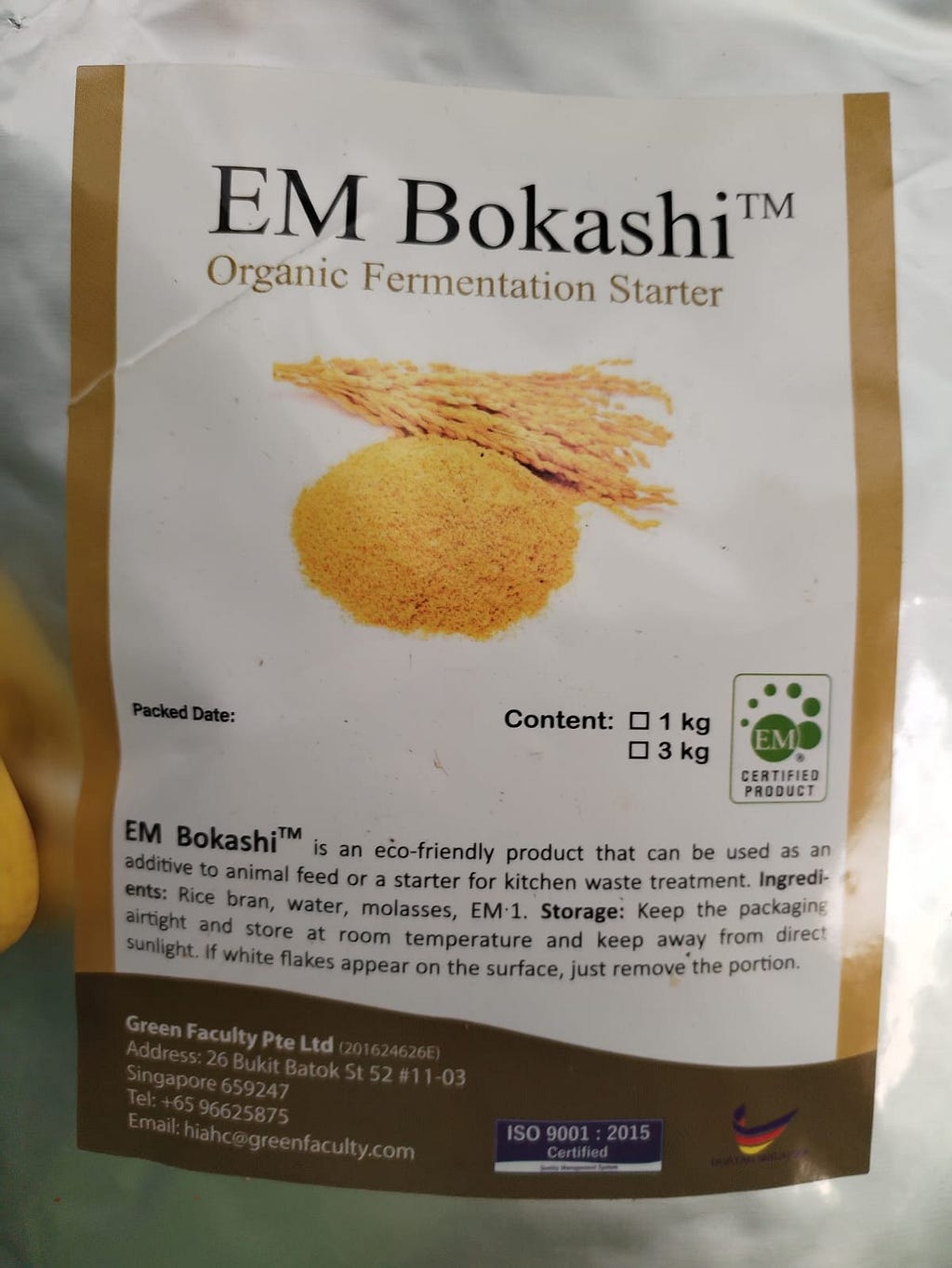
The rice bran mix added to the pre-compost to speed up the fermentation process
Volunteers document the weight of each participant’s contribution, tracking individual waste reduction and community-wide environmental impact. The project’s goal is to significantly reduce landfill waste, encouraging participants to be more mindful of their daily disposal habits.
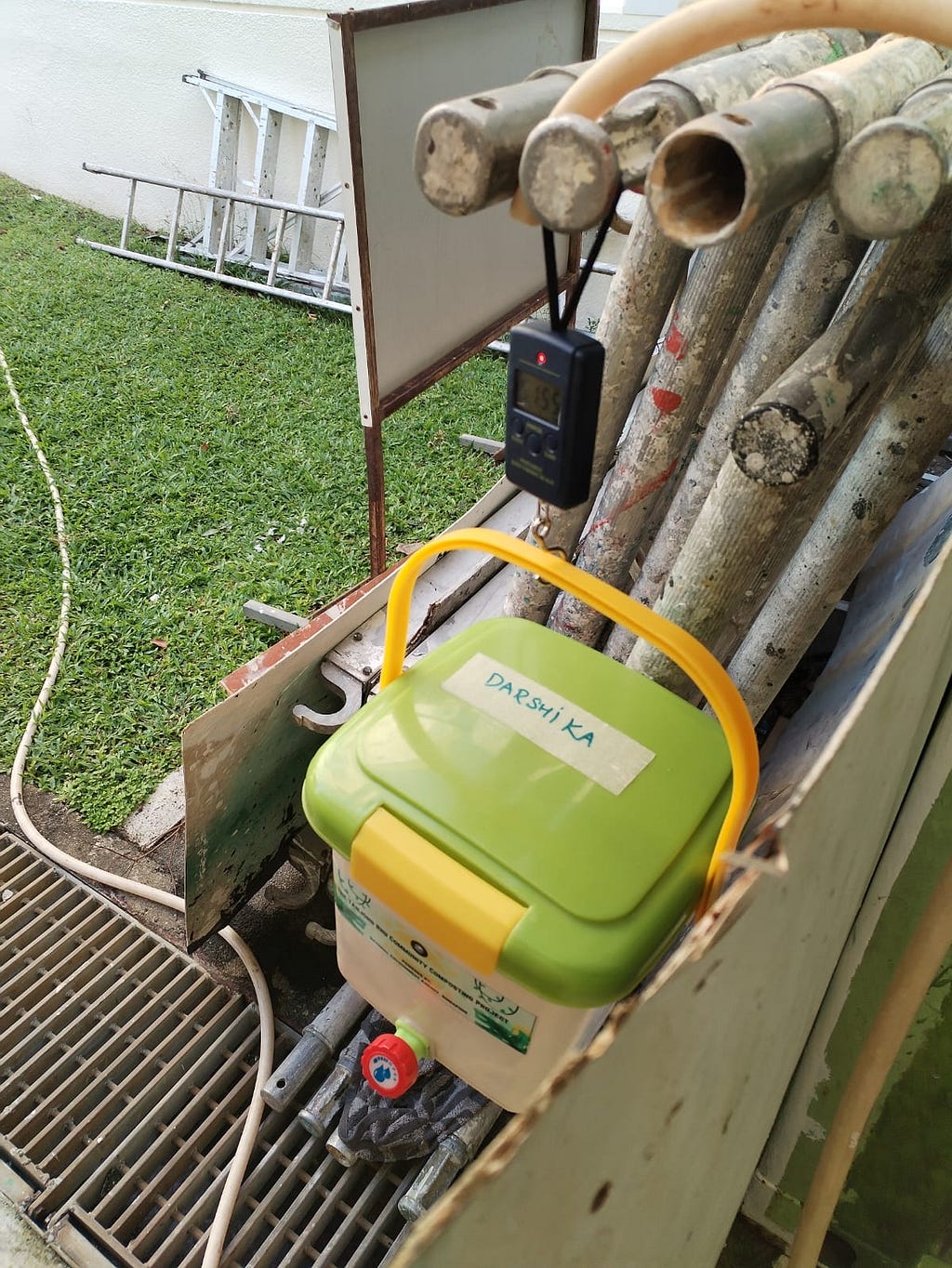
Finally, the common bins are filled to the brim at the end of two weeks of fermentation process, ready to go to the composting site. Rejuvrth’s logistics partner collects filled-up bins with complete fermentation from both Waterside and Costa Rhu are then transferred to the composting site.
The bins are opened and with the help of volunteers, tools and other equipment, food waste is buried in the ground layered with soil. In 4–6 weeks, it breaks down into compost. The first compost batch was sent to Gardens by the Bay (GBTB), and the second batch, even bigger, was sent to GBTB nursery at Choa Chu Kang.
Building Connections One Compost Bin at a Time
As I spoke with residents carrying buckets of food scraps, they shared the unexpected benefits composting has brought to their lives.
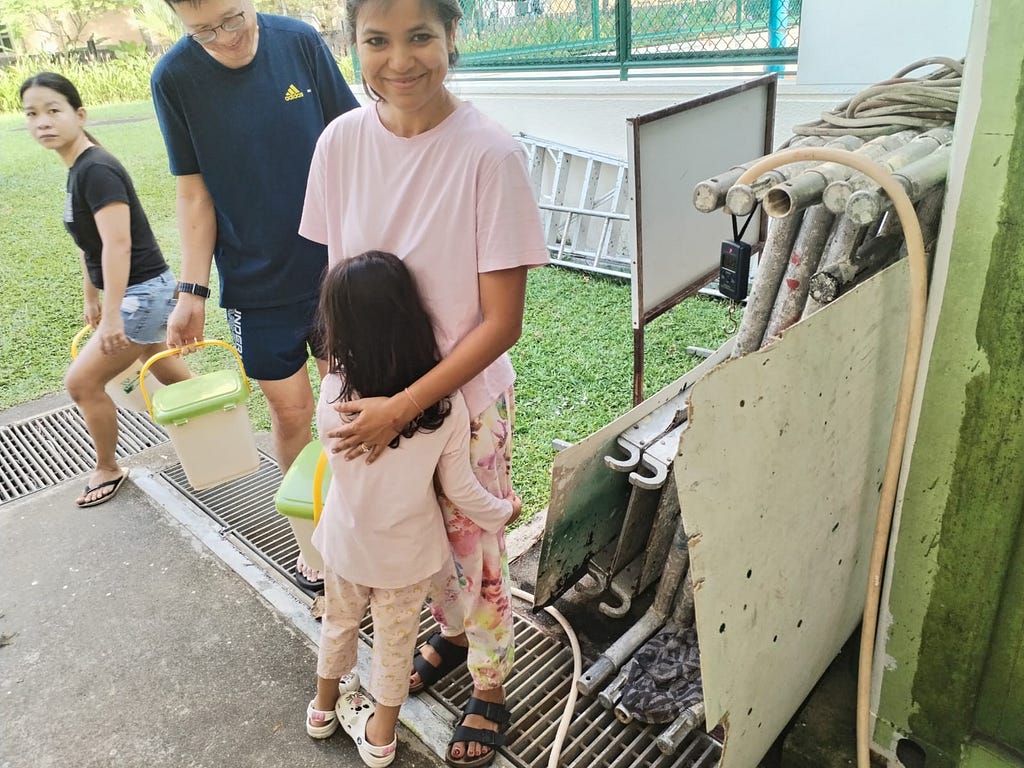
Radhika and her daughter. Tripti jokingly mentions how much the girl’s back has been featured in Rejurvth’s material.
For Radhika and her daughter, the weekly gatherings have become an opportunity to connect with neighbours and build a deeper sense of community. “We’ve met so many people we wouldn’t have otherwise,” Radhika said, adding that composting has encouraged her family to manage waste more thoughtfully. Radhika expressed surprise at the minimal amount of trash her household now contributes to landfills. She attributes her involvement with Rejuvrth to a divine power:’ It was as if God allowed me to cross paths with Rejuvrth–I had the intention to compost and once I moved here, I was able to do so with Tripti and Rejuvrth situated right in my home.’ She says what surprised her the most about composting was how hassle-free it turned out to be. Radhika believes that it is a lifestyle change to compost food waste, albeit a manageable one that contributes greatly to the environment.
The initiative has also attracted those new to composting. Adrian Lim, a recent Costa Rhu resident, was introduced to the idea by a friend-turned-farmer during COVID-19. While he had long been interested in composting, Rejuvrth’s project finally provided him with an accessible way to begin. His interest in Rejuvrth was first piqued when he saw his fellow residents carrying the compost bucket, ‘I saw many people carrying it and I thought, I needed one too!’ He laughed. Luckily for him, he managed to get a place in the composting program due to 3 residents leaving the country, granting him access to one of Rejurvth’s compost bins. He enthusiastically shares with me his long contact list of new friends from Costa Rhu he’s made in his short time here, thanks to Rejuvrth — he has not even finished his house renovations yet. However, he notes that out of 737 Costa Rhu residential units, there are only 40 weekly contributors to Rejuvrth’s composting programme. He hopes that the project will see more engagement. Tripti also mentions that most of the 40 contributing are Indian expats residing in Costa Rhu, and it would be nice for the composting project to expand its reach to more diverse demographics.
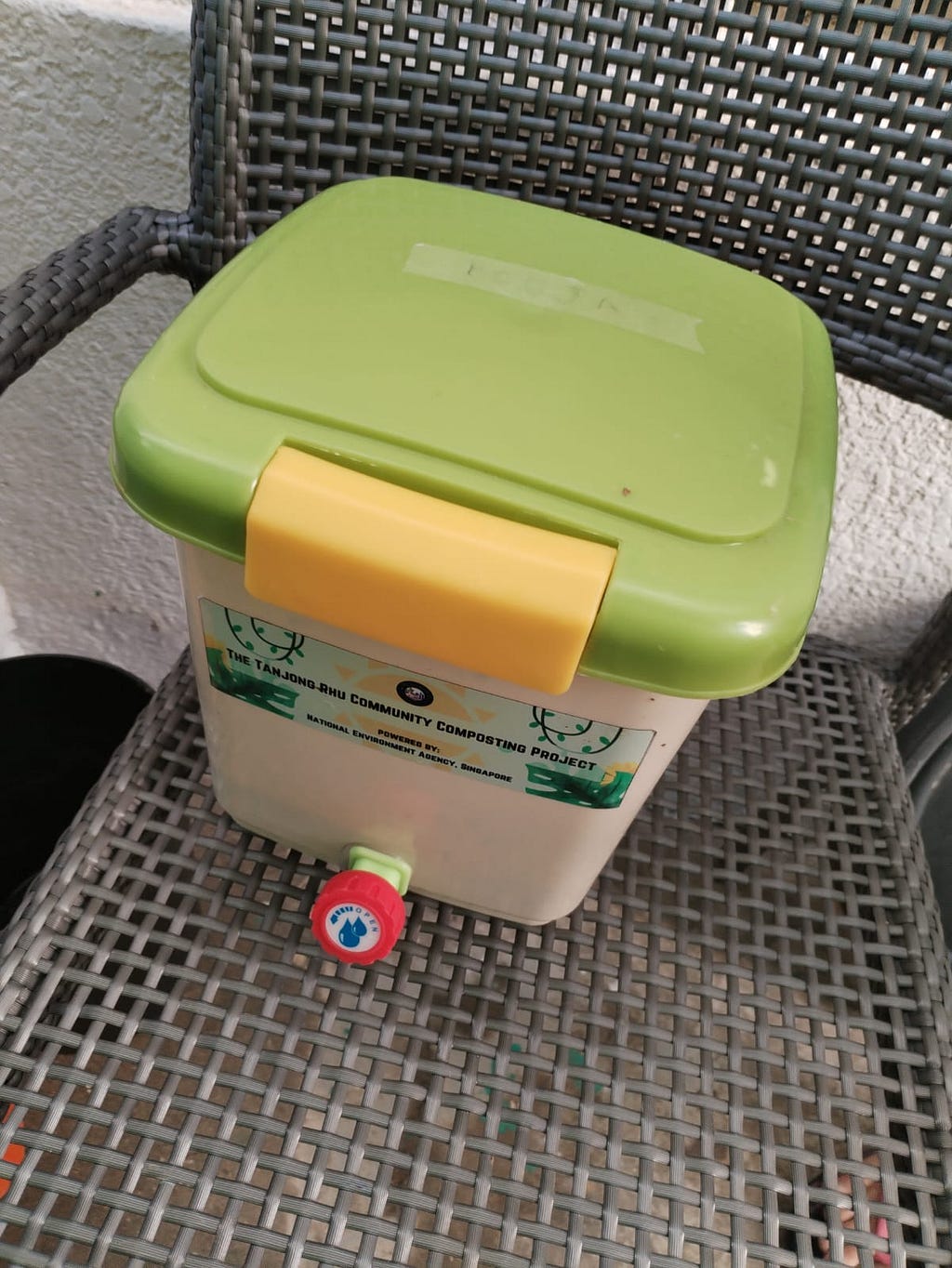
The Rejuvrth compost bucket that Adrian coveted.
Rejurvth’s goal to make composting an islandwide habit
Rejuvrth’s reach goes beyond Costa Rhu, aiming to integrate composting into mainstream practices across Singapore. Tania, who offers her voluntary support as research lead, with assistance from Jun Kai, is currently leading a nationwide survey to gather data on public attitudes toward composting. Tania seeks to leverage her expertise from her PhD in psychology to put together a survey research paper which will seek to quantify how composting influences individual behaviour and community relationships, with findings that could then eventually support broader adoption in public housing estates.
The study, when complete, will provide empirical insights into composting’s environmental benefits and its potential for uniting communities. This information will be shared in a digestible format to encourage Singaporeans from all walks of life to explore the practice, hopefully expanding Rejuvrth’s reach beyond Tanjong Rhu condominiums to include HDBs in Singapore.
A Grassroots Community, Working Together
For the participants, weekly composting sessions have become a time of camaraderie, where neighbours catch up on their lives and reinforce their commitment to a shared purpose. As I observed, the atmosphere was relaxed and inviting, and even those new to composting quickly felt welcomed by Tripti, who has a cordial relationship with all volunteers,
The compost project at Costa Rhu is an inspirational living testament to the power of community action. While currently small in scale, it is a significant step towards a paradigm shift to a more sustainable future, demonstrating how seemingly minuscule individual efforts can have a collective ripple on the environment. By fostering a sense of community and promoting sustainable practices, Rejuvrth is not only transforming food waste but also transforming lives. As the project continues to sprout, I believe it is a significant step towards a greener future where composting becomes a part of everyday life in Singapore.
Helene Ng is a current year 2 student at SMU majoring in Political Science. She’s a writer and an aspiring journalist with an interest in sustainability.
(Disclaimer: The views expressed here are solely those of the author and don’t neccessarily reflect the opinions or beliefs of Rejuvrth and its affiliates.)






